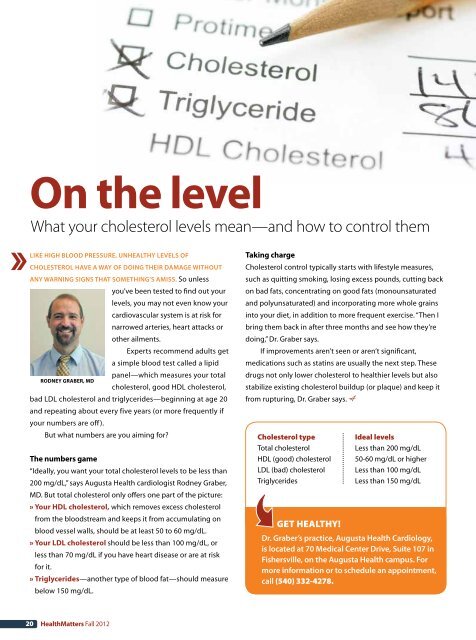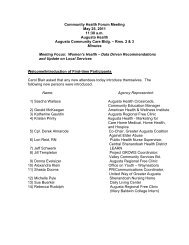Winter - Augusta Health
Winter - Augusta Health
Winter - Augusta Health
You also want an ePaper? Increase the reach of your titles
YUMPU automatically turns print PDFs into web optimized ePapers that Google loves.
On the level<br />
What your cholesterol levels mean—and how to control them<br />
like high blood pressure, unheAlthy levels of<br />
cholesterol hAve A WAy of doing their dAmAge Without<br />
Any WArning signs thAt something’s Amiss. So unless<br />
you’ve been tested to find out your<br />
levels, you may not even know your<br />
cardiovascular system is at risk for<br />
narrowed arteries, heart attacks or<br />
other ailments.<br />
Experts recommend adults get<br />
a simple blood test called a lipid<br />
panel—which measures your total<br />
RODNEy GRABER, MD<br />
cholesterol, good HDL cholesterol,<br />
bad LDL cholesterol and triglycerides—beginning at age 20<br />
and repeating about every five years (or more frequently if<br />
your numbers are off).<br />
But what numbers are you aiming for?<br />
the numbers game<br />
“ideally, you want your total cholesterol levels to be less than<br />
200 mg/dL,” says <strong>Augusta</strong> <strong>Health</strong> cardiologist Rodney Graber,<br />
MD. But total cholesterol only offers one part of the picture:<br />
your HDL cholesterol, which removes excess cholesterol<br />
from the bloodstream and keeps it from accumulating on<br />
blood vessel walls, should be at least 50 to 60 mg/dL.<br />
your LDL cholesterol should be less than 100 mg/dL, or<br />
less than 70 mg/dL if you have heart disease or are at risk<br />
for it.<br />
triglycerides—another type of blood fat—should measure<br />
below 150 mg/dL.<br />
20 <strong>Health</strong>Matters Fall 2012<br />
taking charge<br />
Cholesterol control typically starts with lifestyle measures,<br />
such as quitting smoking, losing excess pounds, cutting back<br />
on bad fats, concentrating on good fats (monounsaturated<br />
and polyunsaturated) and incorporating more whole grains<br />
into your diet, in addition to more frequent exercise. “Then i<br />
bring them back in after three months and see how they’re<br />
doing,” Dr. Graber says.<br />
if improvements aren’t seen or aren’t significant,<br />
medications such as statins are usually the next step. These<br />
drugs not only lower cholesterol to healthier levels but also<br />
stabilize existing cholesterol buildup (or plaque) and keep it<br />
from rupturing, Dr. Graber says.<br />
cholesterol type ideal levels<br />
Total cholesterol Less than 200 mg/dL<br />
HDL (good) cholesterol 50-60 mg/dL or higher<br />
LDL (bad) cholesterol Less than 100 mg/dL<br />
Triglycerides Less than 150 mg/dL<br />
get healthY!<br />
dr. graber’s practice, <strong>Augusta</strong> health cardiology,<br />
is located at 70 medical center drive, suite 107 in<br />
fishersville, on the <strong>Augusta</strong> health campus. for<br />
more information or to schedule an appointment,<br />
call (540) 332-4278.





